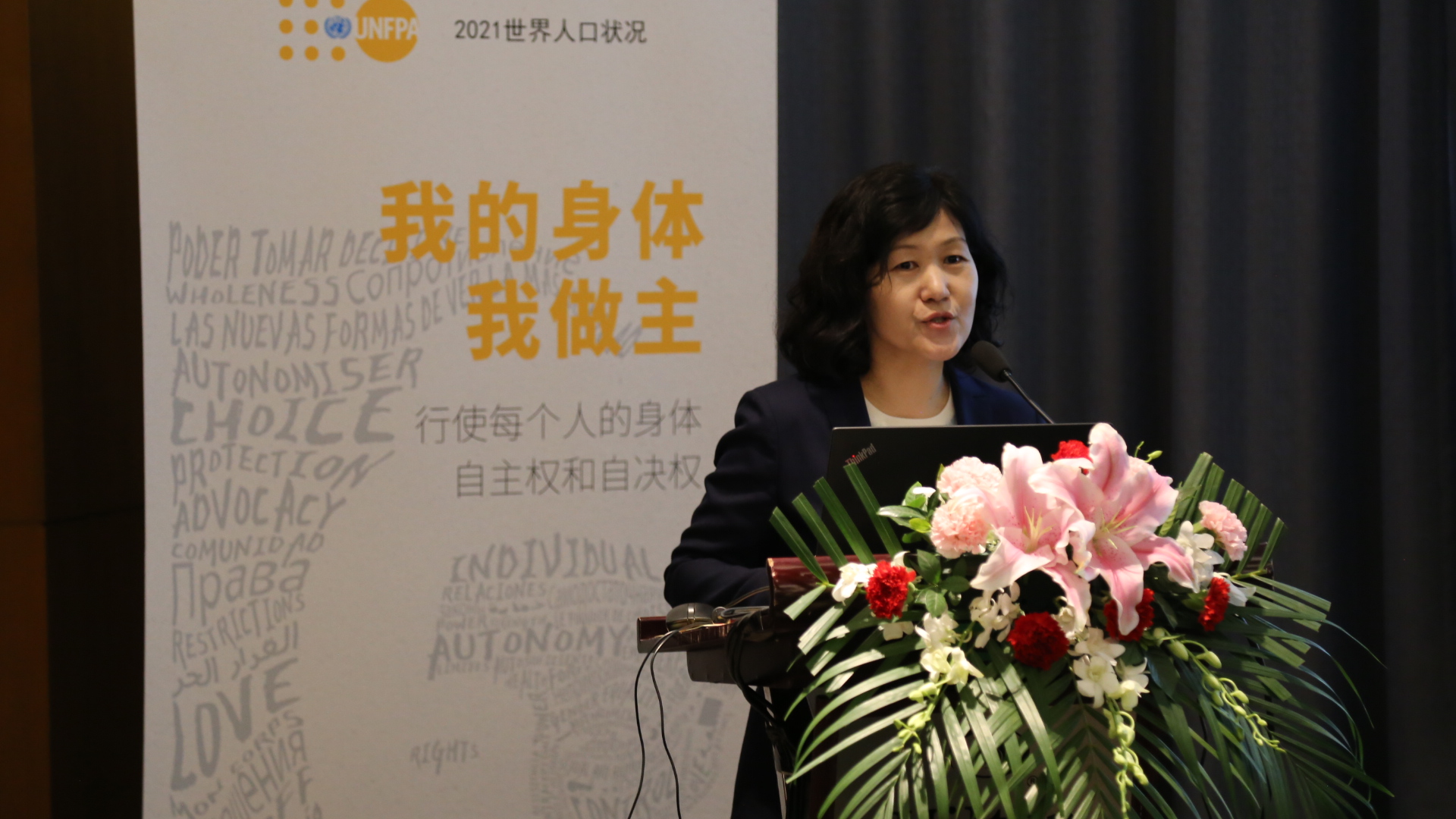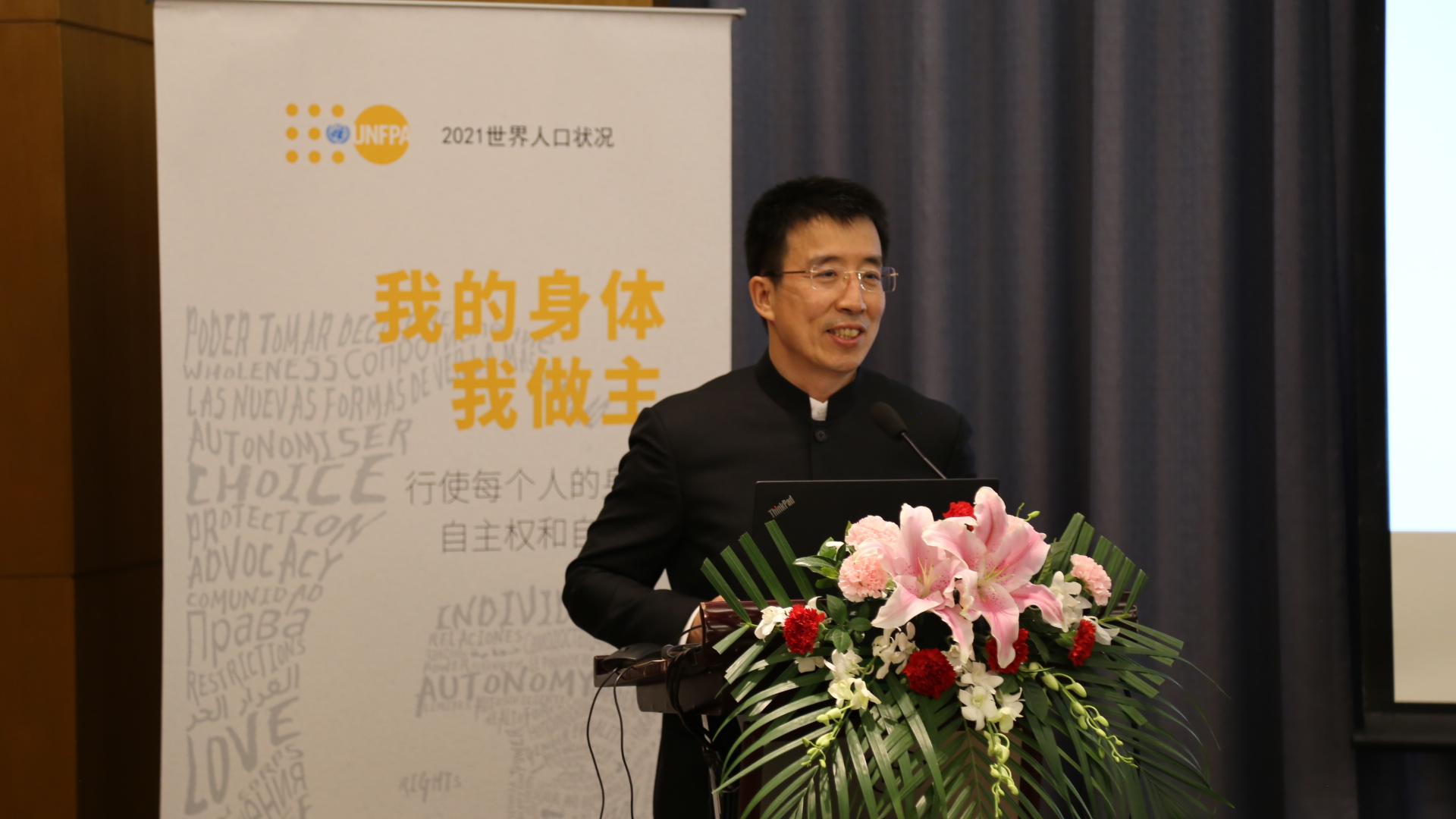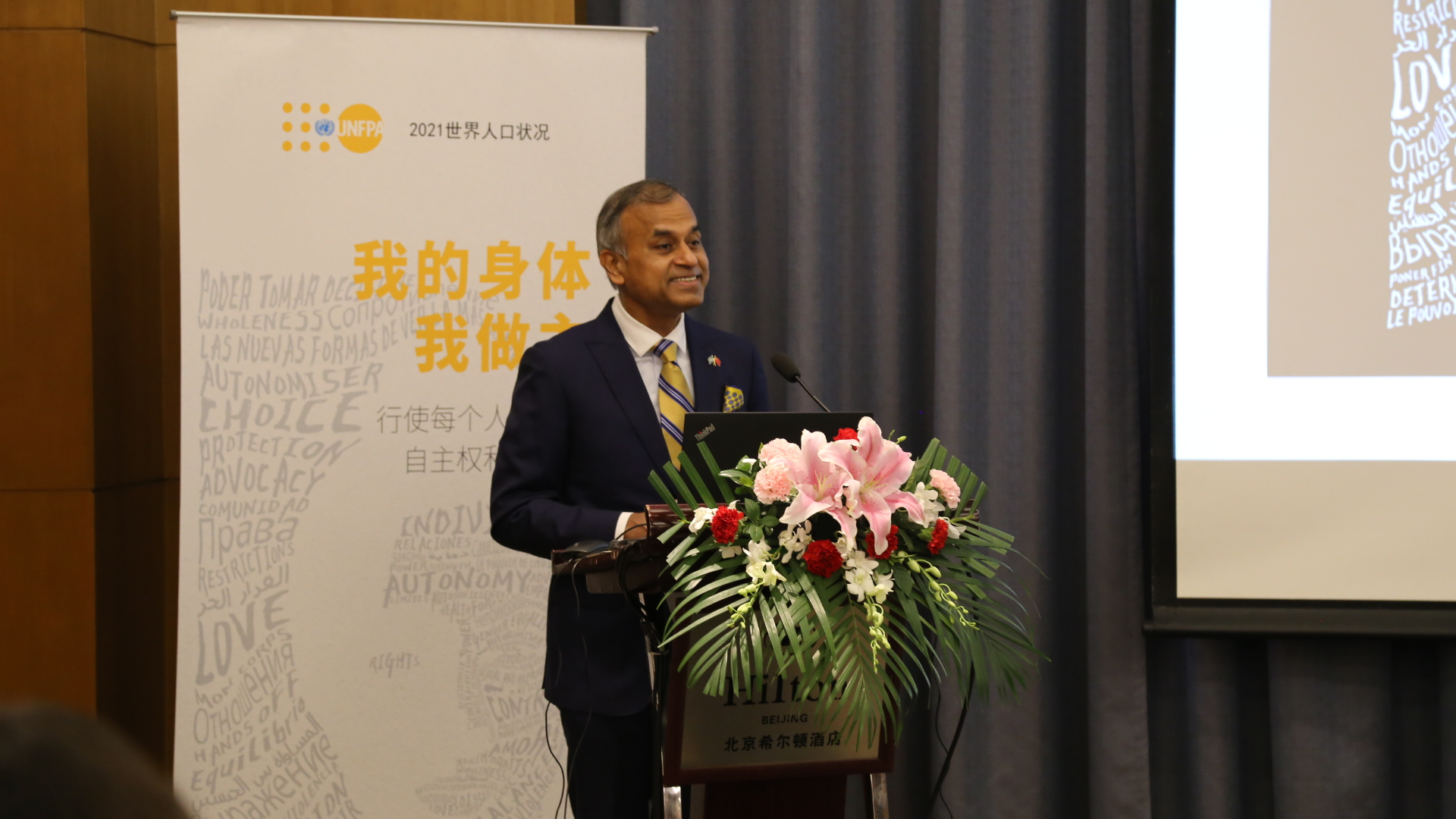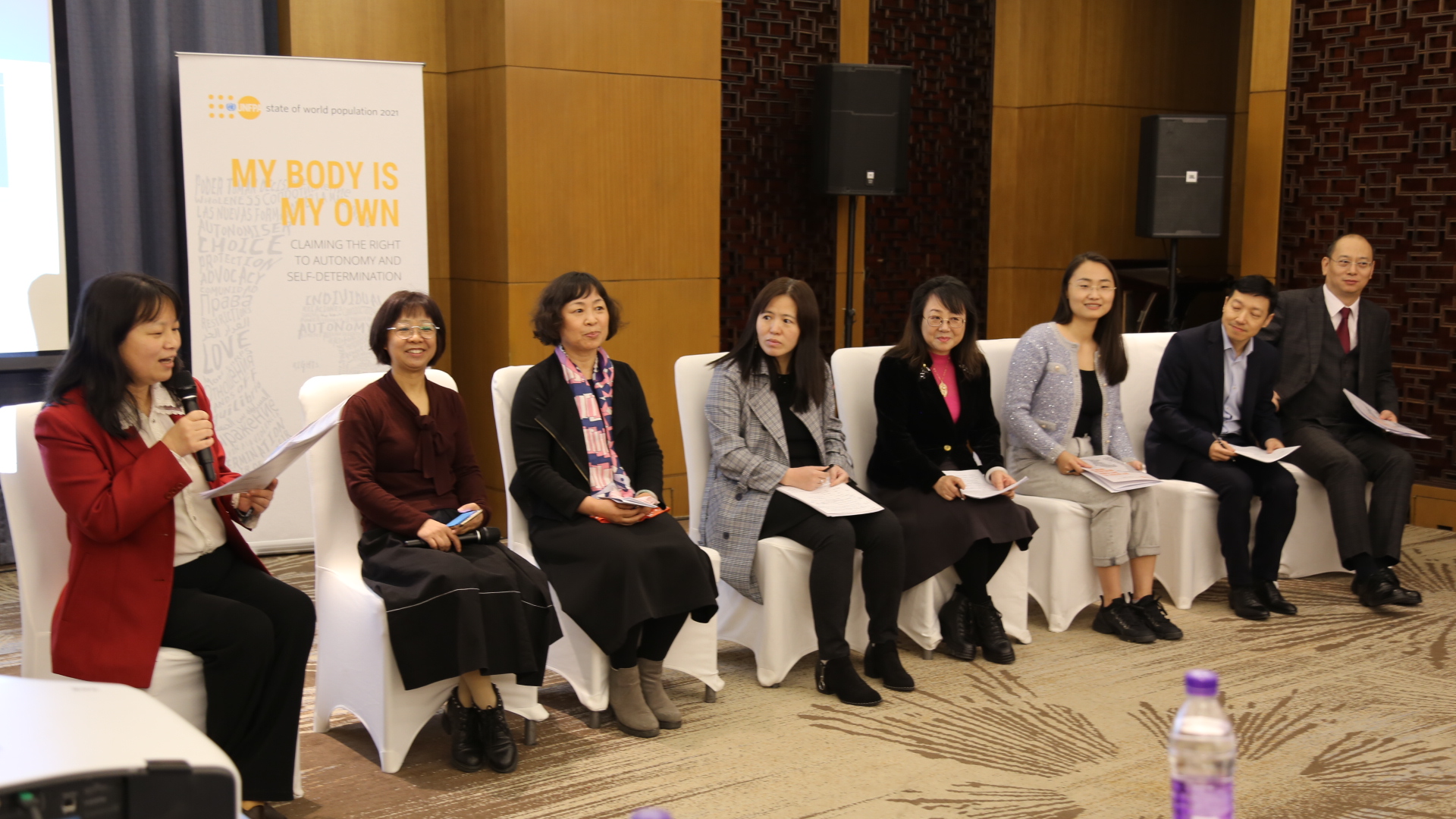BEIJING, China, 16 April 2021—UNFPA, the United Nations Population Fund launched today the 2021 State of World Population global report, titled “My body is my own: claiming the right to autonomy and self-determination” in Beijing.
The State of World Population report is UNFPA’s annual flagship publication. Published yearly since 1978, it provides analysis on emerging population and development, sexual and reproductive health and rights, and gender equality issues, brings them to the attention of the public, and explores challenges and opportunities these issues present for international, national and local development.
For the first time, a United Nations report focuses on bodily autonomy: the power and agency to make choices about your body, without fear of violence or having someone else decide for you.

Navchaa Suren, UNFPA China Representative a.i., presents an overview of the report on 16 April 2021 in Beijing. ©UNFPA China/Haoran Zheng
In China, UNFPA launched the report locally in partnership with the Department of Population Monitoring and Family Development of the National Health Commission. Mr. Siddharth Chatterjee, the UN Resident Coordinator in China and Mr. Yang Wenzhuang, Director-General of the National Health Commission addressed the opening ceremony. Ms. Navchaa Suren, UNFPA China Representative a.i. presented an overview of the report.

Yang Wenzhuang, Director-General of the Department of Population Monitoring and Family Development of the National Health Commission of China, addresses at the launch event of 2021 State of World Population global report in Beijing on 16 April 2021. ©UNFPA China/Haoran Zheng
Key findings: my body, but not my choice
In 2015, the United Nations adopted its transformative 2030 Agenda for Sustainable Development and the accompanying 17 Sustainable Development Goals. It established indicators to help governments track progress towards achieving the goals and their related targets, such as target 5.6: the achievement of sexual and reproductive health and reproductive rights for all.
Two indicators have been identified to measure progress in this area:
- Indicator 5.6.1, aims to measure the proportion of women aged 15 to 49 years who make their own informed decisions regarding sexual relations, contraceptive use and reproductive health care.
- Indicator 5.6.2, tracks the number of countries with laws and regulations that guarantee full and equal access to women and men aged 15 years and older to sexual and reproductive health care, information and education.
Together, these indicators marked a breakthrough in measuring women’s agency and an enabling environment for autonomous decision-making.
According to the report, nearly half of women in 57 developing countries are denied their bodily autonomy, including their right to decide whether to have sex with their partners, use contraception or seek health care.
The report shows that in countries where data are available:
- Only 55 per cent of women are fully empowered to make choices over health care, contraception and the ability to say yes or no to sex.
- Only 71 per cent of countries guarantee access to overall maternity care.
- Only 75 per cent of countries legally ensure full, equal access to contraception.
- Only about 80 per cent of countries have laws supporting sexual health and well-being.
- Only about 56 per cent of countries have laws and policies supporting comprehensive sexuality education.

Siddharth Chatterjee, the UN Resident Coordinator in China addresses at the launch event of 2021 State of World Population global report in Beijing on 16 April 2021. ©UNFPA China/Haoran Zheng
“Depriving women and girls of body autonomy reinforces inequalities and violence, all of which arise from gender discrimination. Gender-unequal norms and attitudes lead to power imbalances in relationships that restrict women’s decisions, particularly when it comes to sex and pregnancy, or that drive the expectation that women must defer to their husbands or partners in all aspects of their lives,” said Mr. Siddharth Chatterjee, the UN Resident Coordinator in China.
The report also documents many other ways that the bodily autonomy of women, men, girls and boys is violated, revealing that:
- Twenty countries or territories have “marry-your-rapist” laws, where a man can escape criminal prosecution if he marries the woman or girl he has raped.
- Forty-three countries have no legislation addressing the issue of marital rape (rape by a spouse).
- More than 30 countries restrict women’s right to move around outside the home.
- Girls and boys with disabilities are nearly three times more likely to be subjected to sexual violence, with girls at the greatest risk.
Solutions: the power to say yes, the right to say no
The report outlines the solutions: achieving bodily autonomy depends on ensuring gender equality, eliminating all forms of discrimination and expanding choices and opportunities for women, girls and excluded groups:
- Education is key. Women with more education are more likely to make their own decisions about contraception and health care, and to be able to say no to sex. Comprehensive sexuality education—meaning age-appropriate, accurate information about one’s sexual and reproductive health and rights—is crucial.
- Social norms must become more gender equitable. Improving women’s opportunities for livelihoods and leadership roles in their community and beyond can increase their power to make decisions within households and about their bodies. And progress fundamentally depends on men being willing to step away from dominating roles.
- Health providers have a critical role to play in upholding and affirming the bodily autonomy of those seeking information and care. Patients must be aware of their rights, and they must be asked for informed consent.
- Laws can have a significant impact on women’s rights, gender equality and sexual and reproductive health. They must be aligned with globally agreed human rights principles and commitments, and reviewed for gender responsiveness and non-discrimination.
- Track progress through reliable and complete data to identify which groups and communities are at risk of being excluded and need additional support.
“In broad terms, we already know that achieving bodily autonomy for women and girls depends on realizing gender equality on all fronts, and that sexual and reproductive health and reproductive rights are among the most important entry points.” Mr. Chatterjee added.
Bodily autonomy: China focus

Panel discussion during the launch event on 16 April in Beijing. ©UNFPA China/Haoran Zheng
The event also discussed bodily autonomy issues in China, with seven national experts, women, men and youth representatives from China Population and Development Research Centre, China Family Planning Association, China White Ribbon Volunteers Network Programme, Beijing Normal University, Women’s Research Institute of China, China Youth Network, the United Nations Development Programme in China participated.
According to the event, China attaches great importance to gender equality and women’s development. It has upheld the constitutional principle of equality between men and women, with more than 100 laws and regulations enacted or amended to provide fundamental guarantee for safeguarding women’s rights. However, China still faces challenges in achieving gender equality. Although official data is not available for most SDG5 indicators in China, other resources suggest that the persistent gender inequality and harmful gender norms and stereotypes exist. Violence against women and girls, as well as sexual minorities remains.
In areas of sexual and reproductive health and rights, China has made some remarkable progress, such as reduction in maternal mortality and high level of hospital deliveries. China has also reached a high level of contraceptives prevalence rate over 80%. However, recent studies show that the unmet contraceptive needs have increased from around 2% in 2001 to 8.7% in 2017. In addition, over 9 million induced abortions have been performed in China annually in the past few years. To address those challenges, more women and young people in China need to be empowered to govern their own bodies. The national health system could also be improved to safeguard women and young people’s sexual and reproductive rights and choices, and aim to deliver an essential reproductive health service package of universally available.
Notes to editors
UNFPA is the United Nations sexual and reproductive health agency. It supports countries including China with programmes that are guided by the Programme of Action of the landmark International Conference on Population and development in 1994, which made the empowerment and autonomy of women a basis for global action for economic and social progress, and was enforced by the 2030 Agenda for Sustainable Development and its SDGs.
- To access the UNFPA 2021 State of World Population full report
English version: https://china.unfpa.org/en/publications/21041401
- To access the UNFPA 2021 State of World Population report highlights
English version: https://china.unfpa.org/en/publications/21041402
Chinese version: https://china.unfpa.org/zh-Hans/publications/21041402
- For more information about UNFPA, please visit:
www.unfpa.org
https://china.unfpa.org/

